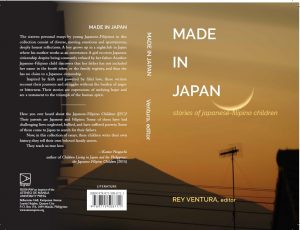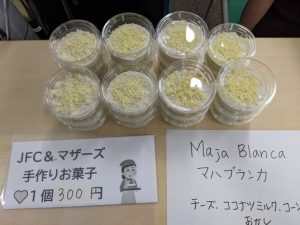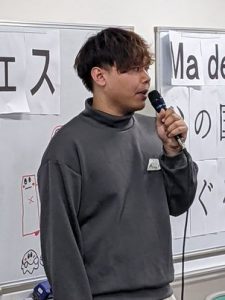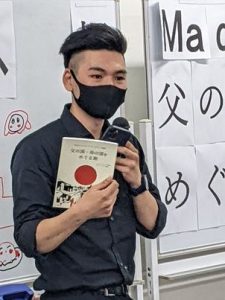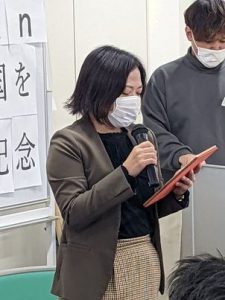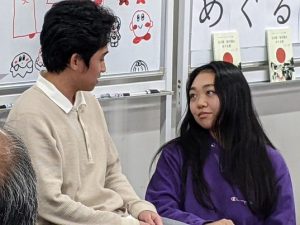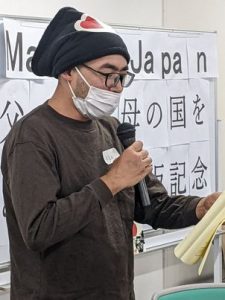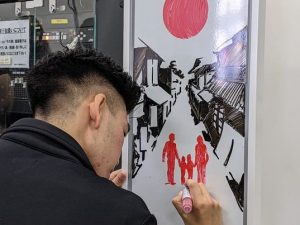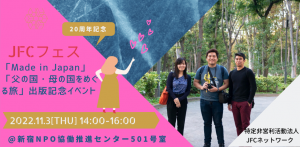ニュース詳細
![]() 2022.11.07
2022.11.07
「JFCフェス」が11月3日に開催されました♪
「JFCフェス」が11月3日に開催されました。(※English is below)
これは2020年9月30日に出版されたJFCユースたちのエッセイ集「父の国・母の国をめぐる旅」の出版記念集会でした。コロナ禍で2年待っての開催となりました。この本は、2014年のJFCネットワーク20周年の際にJFCユースのエッセイコンテストが行われ、その時のエッセイをRay Venturaさんが編集し、「Made in Japan」として、フィリピンのアテネオ大学から英語版が出版されました。「父の国・母の国をめぐる旅」はその日本語版となります。
さて、当日、約60名の方が参加して下さいました。参加申し込みをされて当日出席ができなかった方は、当日の映像を御覧に頂けますのでしばらくお待ちください。
JFCフェスでは、英語版の執筆をされたJFCや日本語版の写真や表紙絵の作成に関わったJFCからの歌や詩の朗読などが披露されました。
日本語で詩を書くのが夢だという石川建さんからは、父への想いを込めた詩と俳句が披露されました。
俳優を目指している池田セイジさんからは友人と一緒に二人芝居が披露されました。芝居の登場人物はドラックの取引に手を染め、苦境に立たされた2人の若者を描いたものでした。
エッセイの執筆者の一人である林明子さんからは日本のパスポートを持っていても「日本人」といえる自信がないこと、こうした葛藤をしているJFCが多くいることを自分自身が語っていかなければという意思を伝えてくれました。
同じくエッセイの執筆者の一人である津田友理香さんは、同じような背景をもつ人たちの想いを代弁するためにエッセイを書き始めたことを語ってくれました。
16歳から詩を書き始めたという河西誠人さんはまだ来日して間もないのですが、自作の詩と歌が披露されました。ラップバトルが好きなだけあってタガログ語の詩のリズムが心地よかったです。
日本語版の表紙デザインを描いた矢菅和朗さんは会場でも同じ絵を黒板に描いてスピーチをしてくれました。「真ん中に太陽をまず描いたのは、太陽はどんな人にも、日本にいても、フィリピンにいても平等にその日差しは注ぐから。そして本の表に敢えて完璧な家族を描いたのは世の中には完璧な家族はいないということを示したかったから。うまくいっているように見えても本人にしかわからないことがある」と話し、裏表紙には1人かけた家族を描いた気持ちを語ってくれました。
日本語版に掲載されている写真を撮った一人の武田純一さんはフィリピンにいた時は自分の真面目な性格を「普通じゃない」と感じていたこと、来日の目的はお金を貯めてフィリピンに戻ってビジネスをする予定だったこと、しかし日本での生活が長くなるにつれ、日本が好きになり、もっと日本語を勉強して日本をもっと評価できるようになりたい胸の内を語ってくれました。
エッセイの執筆者の一人である田中佐紀さんからは歌の披露がありました。とても素晴らしい歌声に会場の皆が聴き惚れたことと思います。これまでの人生は困難に満ちていたけど困難に立ち向かって生きていくこと、今は針灸の勉強をしていて将来は人々の健康のための仕事に携わりたいことを語ってくれました。
今回MCも務めた長谷川大知さんは、パフォーマーの一人でもあった石川健さんの詩「Disappointed」(失望)のストーリーをビートボックスで表現しました。「曲の内容は重たいかもしれないけど、感情それ自体にポジティブとかネガティブとかないと思っていて、どんな感情も表現されるべきだと思う」というビートボックスは迫力でした。
今回、1999年頃からマリガヤハウスのスタッフだった、河野尚子の前任者の松本みづほさんが参加してくださいました。最後の質疑応答の時間に、「当時マリガヤハウスで係るJFC達は、小さな子どもたちが中心でした。でも今 成長したJFC達の姿に驚きました」と話されました。改めてJFCの中心世代はユースになってきていることを感じました。
はじめの言葉と終わりの言葉を下さったRay Venturaさんは、自分自身のストーリーを語ることの大切さや意義を語ってくれました。語ることが自分自身の気分を軽くすることつながること、また、今まで見たことのない自分の一面を発見するかもしれないと。
とても素晴らしい会になりました。当日ご参加下さったパフォーマーの皆さん、会場にお越しくださった皆さん、そして実行委員の皆さん、本当にありがとうございました。
「Made in Japan」も「父の国・母の国をめぐる旅」の在庫はまだありますのでお求めいただけます。
“JFC Festival” was held on November 3.
This was a gathering to celebrate the publication of a book of essays by JFC youth entitled “Chichinokuni Hahanokuni wo Megurutabi/ Journey to the Land of the Father and the Land of the Mother,” which was published on September 30, 2020. The event was held after a two-year wait at the Covid-19. The book was published in English by Ateneo University in the Philippines as “Made in Japan,” edited by Ray Ventura, based on essays from the JFC Youth Essay Contest held during the 20th anniversary of the JFC Network in 2014. The book, “Journey to the Land of My Father and the Land of My Mother,” is the Japanese edition of the contest.
On the day of the event, we had about 60 participants. For those who registered for the event but were unable to attend on the day of the event, please wait a few days to view the video of the event.
At the JFC Festival, songs and poems were sung and read by JFC, which was involved in writing the book of English version and in creating the photos and cover art for the Japanese version.
Mr. Ken Ishikawa, whose dream is to write poetry in Japanese, presented poems and haiku expressing his feelings for his father.
Mr. Seiji Ikeda, dreaming of becoming an actor, performed a two-person theater performance with his friend. The performance showed two youths who had fallen on hard times after getting involved in the drug trade.
Akiko Hayashi, one of the authors of the essay, expressed her lack of confidence in being able to call herself “Japanese” even though she has a Japanese passport, and her willingness to speak out about the many JFCs who are facing these struggles.
Yurika Tsuda, also one of the essay authors, told us that she started writing the essay to speak for those who have similar backgrounds.
Makoto Kawanishi, who has been writing poetry since he was 16 and has only been in Japan recently, performed a poem and song of his own composition. The rhythm of his Tagalog poems was so comfortable, as he loves rap battles.
Mr. Kazuo Yasuge, who drew the cover design for the Japanese edition of the book, also drew the same picture on the blackboard at the venue and gave a speech. He said, “I drew the sun in the middle because the sun shines equally on everyone, whether they are in Japan or in the Philippines. And I drew a perfect family on the front of the book because I wanted to show that there is no perfect family in the world. Even if things seem to be going well, there are things that only you can understand,” he said, explaining how he felt about depicting a family with only one member on the back cover.
Mr. Junichi Takeda, one of the photographers whose picture can be found in the Japanese edition, said that when he was in the Philippines, he felt his serious nature was “not normal,” and that his purpose for coming to Japan was to save money and return to the Philippines to do business, but as he spent more time in Japan, he fell in love with Japan and However, the longer he lived in Japan, the more to like Japan, and the more he wanted to learn more Japanese so that he could better evaluate Japan.
Ms. Saki Tanaka, one of the authors of the essay, sang a song. Her voice was so wonderful that everyone in the hall enjoyed listening to her singing. She told us that her life has been full of difficulties so far, but that she would continue to live up to the difficulties and that she is currently studying acupuncture and would like to be involved in work for people’s health in the future.
Mr. Daichi Hasegawa, who also worked as MC for this event, beatboxed the story of “Disappointed,” a poem by Mr. Ken Ishikawa, who was also one of the performers. The beat box was powerful, as he said, “The content of the song may be heavy, but I don’t think emotions themselves can be positive or negative, and I think all emotions should be expressed.
Ms. Mizuho Matsumoto, who was a former staff of Maliaya House since around 1999 after Naoko Kono, joined us this time. During the Q&A at the end of the session, she said, “At that time, the JFCs at Maligaya House were mainly small children. I was surprised to see how much they have grown. ” We felt once again that the core generation of JFCs is becoming youths.
Mr. Ray Ventura, who gave the opening and closing remarks, spoke about the importance and significance of telling your own story. He said that telling your story can help you feel lighter and that you may discover a side of yourself that you have never seen before.
It was a wonderful event. We would like to thank all the performers who participated in the event, everyone who came to the venue, and all the project members for your hard work.
We still have stocks of “Made in Japan” and “Journey to the Land of the Fathers and the Land of the Mothers” available for purchase.
